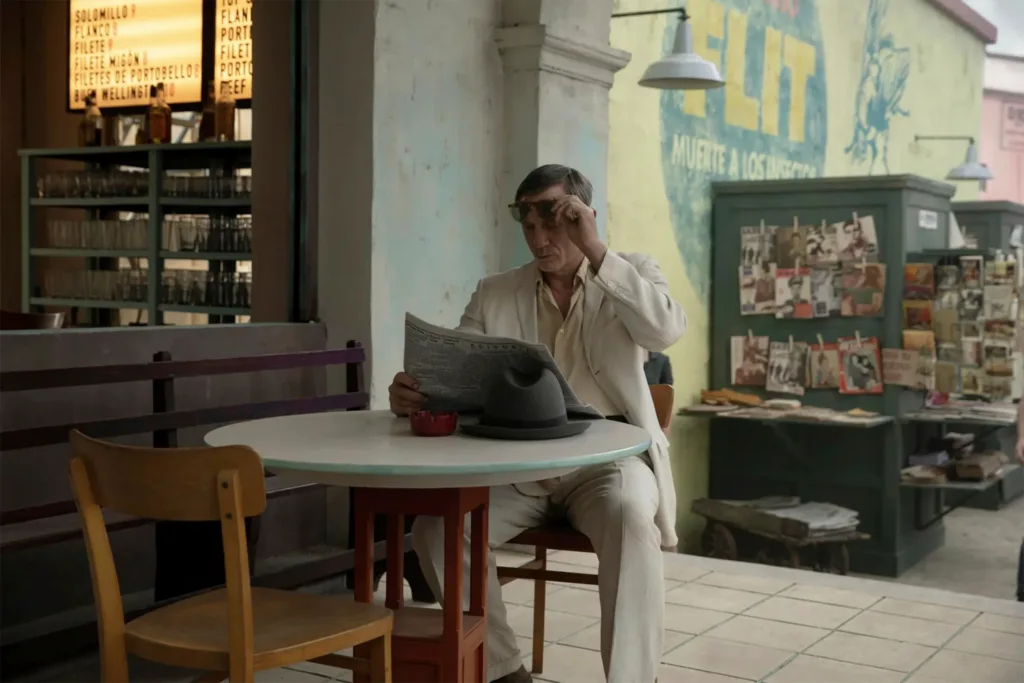Luca Guadagnino’s latest cinematic endeavor, Queer, has landed with all the intensity and beauty that fans of the director have come to expect. Known for his remarkable ability to capture the addictive nature of love in films like Call Me by Your Name and I Am Love, Guadagnino now turns his attention to William S. Burroughs’ 1950s novel Queer. With Daniel Craig in the lead role, Queer is an evocative exploration of longing, self-destruction, and the complications of unreciprocated love. The film recently made waves at TIFF 2024, where its unique blend of body horror, surrealism, and intense emotional depth drew considerable praise.
Queer – A Love Story of Uncertainty
Queer follows William Lee (played by Daniel Craig), a queer American living in 1950s Mexico City. Lee drifts aimlessly through the heat-soaked streets, indulging in alcohol and casual sexual encounters, all while grappling with his growing addiction to heroin. His existence is a blur of numbed emotions until he meets Eugene Allerton (Drew Starkey), a younger man who catches Lee’s attention. What begins as casual interest quickly spirals into an all-consuming obsession for Lee, who sees in Allerton something more than a fleeting affair.
Lee’s desire for Eugene is both profound and devastating. Throughout the film, the audience watches as Lee becomes more attached to Allerton, who remains aloof and distant. Allerton’s affections are inconsistent, sometimes showing care for Lee and other times treating him like a stranger. This dynamic torments Lee, who yearns to understand the man he is falling for but is constantly met with a wall of emotional ambiguity.
Lee’s desperation leads him to a fascination with a mystical drug called “yage,” which, according to legend, grants its users telepathic abilities. For Lee, the possibility of reading Allerton’s mind and truly understanding his feelings becomes an obsession, mirroring his dependency on drugs. The film’s exploration of addiction, both to substances and love, is one of its core themes, as Lee’s search for yage becomes a metaphor for his desire to grasp what seems perpetually out of reach.
Daniel Craig’s Most Daring Role Yet
Daniel Craig’s portrayal of William Lee is nothing short of extraordinary. Stepping away from the glamorous world of 007, Craig dives headfirst into the deeply flawed, often messy character of Lee. In Queer, he masterfully balances Lee’s outward charm and inner turmoil, making him both endearing and tragic. Lee is a man who hides his pain behind a façade of confidence, and Craig brings this vulnerability to life with one of his most daring performances to date.
Lee’s outgoing nature stands in contrast to his deep internal loneliness, and Craig’s ability to navigate these conflicting emotions is a testament to his range as an actor. It’s a role that pushes Craig far beyond the confines of the suave, action-packed persona he’s known for, allowing him to explore new emotional depths. His portrayal of a man addicted to love and struggling with his own demons will undoubtedly be remembered as one of the finest performances of his career.
Drew Starkey, as Eugene Allerton, provides the perfect foil to Craig’s Lee. His portrayal of Allerton as a man who remains emotionally guarded keeps the audience—and Lee—on edge, unsure of where his feelings truly lie. The dynamic between the two actors is electric, with their scenes together filled with tension, longing, and frustration.
Guadagnino’s Masterful Direction
Luca Guadagnino’s direction in Queer is, as always, visually stunning and emotionally charged. Known for his ability to create rich, atmospheric worlds, Guadagnino brings 1950s Mexico City to life in all its heat and chaos. The film uses slow, meditative pacing to allow the audience to feel the weight of Lee’s emotions, drawing them into his increasingly desperate world.
One of the most notable aspects of the film is its use of anachronistic music. Guadagnino pairs scenes of 1950s Mexico City with modern tracks from artists like Nirvana and Prince, creating a surreal contrast that perfectly captures Lee’s internal state. The film opens with a haunting cover of Nirvana’s “All Apologies,” setting the tone for the rest of the film. This unexpected choice of music adds to the dreamlike quality of the movie, blurring the lines between time, reality, and fantasy.
Guadagnino’s collaboration with composers Trent Reznor and Atticus Ross once again proves to be a winning combination. The duo’s atmospheric score perfectly complements the emotional intensity of the film, enhancing the viewer’s immersion into Lee’s world of addiction, love, and loss.
A Surreal, Avant-Garde Third Act
While the first two-thirds of Queer focus on Lee’s relationship with Allerton, the film takes a sharp turn in its final act, delving into more surreal, avant-garde territory. As Lee’s obsession with finding yage intensifies, the film introduces elements of body horror and surreal imagery, reminiscent of the works of David Lynch and Luis Buñuel. This shift in tone is jarring but effective, as it mirrors Lee’s descent into madness and desperation.
For some viewers, this final act may feel disconnected from the rest of the film, but for those willing to embrace the more experimental elements, it adds a fascinating layer to the story. Guadagnino and screenwriter Justin Kuritzkes use this section of the film to push the boundaries of the source material, creating a new and unsettling conclusion to Burroughs’ novel.
A Bold, Addictive Masterpiece
Queer is an audacious and emotionally raw adaptation of William S. Burroughs’ novel. With stunning performances by Daniel Craig and Drew Starkey, masterful direction from Luca Guadagnino, and a surreal, dreamlike atmosphere, the film explores the complexities of love, addiction, and desire in a way that is both beautiful and heartbreaking. Though its experimental elements may not be for everyone, Queer is a bold cinematic experience that cements Guadagnino’s status as one of today’s most essential filmmakers.
For fans of Guadagnino’s previous work, Queer is a must-see. It’s a film that lingers long after the credits roll, offering a deeply human portrayal of love and the lengths we go to in order to understand it.
